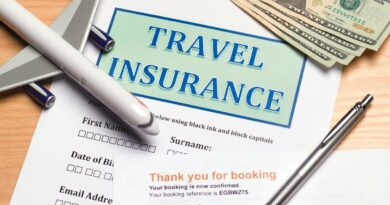Travel money: How to save on holiday spending – six tricks to avoid hidden costs
Mum shares process to reserve sunbed on holiday
We use your sign-up to provide content in ways you’ve consented to and to improve our understanding of you. This may include adverts from us and 3rd parties based on our understanding. You can unsubscribe at any time. More info
As school holidays begin across Britain, many will be taking to somewhere warm and sunny overseas to enjoy it. But while living costs spiral and the average household’s disposable income shrinks further, those that have managed to scrape together the funds for a holiday will likely be sticking to a slightly stricter budget this year.
Poor exchange rates and hidden international transaction fees are just a few of the many holiday-spending mishaps Britons face while travelling abroad.
The more fees faced, the faster your spending budget gets swallowed, which makes it key to be aware of what to look out for and where exactly to spend money to get the most out of your holiday.
Fortunately, there are some easy tips to keep in mind when travelling to help you save rather than splurge, and here are six of them.
Call your credit card company before leaving
If you plan on using your debit or credit card abroad, a key tip is to phone your provider and let them know.
Experts at Tymit said: “This will ensure that your card will not be suspended for suspicious activity.”
Spend in the local currency
When abroad, make sure to always spend in the local currency when given the option.
Jonathan Merry, CEO at international money transfer comparison site, MoneyTransfers.com said: “It can be tempting if you are none the wiser to pay in sterling pounds rather than the local currency when given the option by a retailer.
“However, this is where you will fall victim to uncompetitive exchange rates, which could potentially mean you end up paying up to 5 percent more than the cost.”
So, when asked on the card terminal whether you’d rather pay in pounds or local currency, always opt for the latter.
Check for credit card transaction fees
According to experts, it’s crucial to check you’re travelling with the right bank card. Some cards charge you for using your card abroad.
Mr Merry said: “Some banks will charge you transaction fees, as well as purchase fees on everything purchased overseas.
“This can all soon start to add up if you are making several different purchases abroad. You should also check if your bank will charge you for taking money out of a cash point overseas.”
Cards with providers such as Tymit, and Monzo (up to certain figures) won’t charge you for overseas purchases.
Mr Merry said: “Another option may be a prepaid card, which you can transfer money onto before travelling, in order to avoid fees when paying abroad.
“If you are moving abroad for a long period of time and are going to be making big overseas purchases, then the most cost-effective way to pay for these items is by using a money transfer provider, as they offer far better exchange rates than high street banks.”
To explore and compare money transfer providers, you can use this Transfer Rate tool to help.
Use public transport or explore on foot
When travelling on a budget, it’s natural to forget about the cost of getting around towns and cities.
DON’T MISS:
Brit travellers are ‘more laid back’ compared to US counterparts [ANALYSIS]
Cheapest town in UK to visit this summer is ‘stunning’ – full list [INSIGHT]
Beach hack to avoid ‘sand getting everywhere’ – ‘genius’ [EXPLAINED]
The best option for travel is, unsurprisingly, to do so on foot. Not only is this totally free, but it’ll also allow you to take in more of the sites as you go.
If this isn’t an option, there are many other cost-effective methods of physical and public transport to get you around at a much cheaper price than a taxi.
Mr Merry said: “Many cities also offer bike rentals with pick-up and drop-off locations dotted around the city, which is a quicker option than walking.
“But if travelling on foot or bike isn’t an option, then always opt for public transport.
“The majority of cities have great public transport options such as trains, buses and metros or subways.”
By putting your current location and desired location into Google maps and hitting the public transport button, it’ll direct you on how to reach the appropriate bus terminal by foot and outline exactly what bus you should take and where to get off.
The expert added: “Although hailing a taxi is quicker and more convenient, you will end up paying a lot more and if need to book an airport transfer, make sure you do these well in advance to avoid having to pay the high prices on the day.”
Don’t splurge on tourist or travel passes
Before splurging out on tourist or travel passes, always calculate whether they will actually be worthwhile.
Mr Merry said: “Try to plan a rough itinerary before travelling so you can see exactly how often you will need to hop on public transport or how much sightseeing you will realistically fit into your holiday, as you may not actually get your money’s worth.”
Don’t leave currency exchange until the last minute
Lastly, for those bringing cash, don’t leave your currency exchange until the last minute at the airport.
Although it might seem convenient, you’ll inevitably end up paying more for it.
Mr Merry said: “If your holiday is last-minute and you have no other choice but to use the airport currency exchange services, the majority of airports allow you to buy your currency online and pick it up once you’ve arrived.
“This can be done the night before you fly and will have a much better rate than in-person on the day.”
Source: Read Full Article






